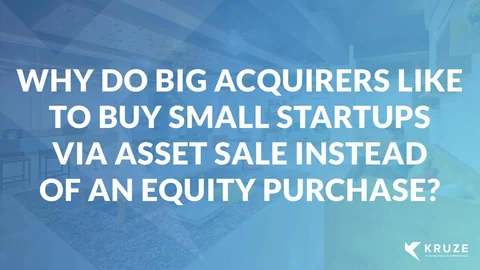
Why do big companies like to buy smaller startups in an asset sale versus an equity purchase? The answer is pretty simple. In an equity purchase, the big company assumes the assets AND the liabilities of the company they buy, vs in an asset purchase they only buy the assets and the liabilities stay with the owners of the purchased company.
The classic example of this is maybe a lease was not disclosed to the acquirer, and the acquirer’s on the hook for a couple hundred thousand dollars a year for another five years. Another example could be a sexual harassment suit brewing or being filed that was not disclosed. Examples like the ones mentioned are all costly issues, and the big company is just trying to buy the startup for their technology, team, brand, and customer relationships.
They do not want any of these unintended liabilities that can come back and bite them later. So, the big companies will do what is right and buy the company in an asset sale. In an asset sale, you are just buying the assets and not assuming all the company’s liabilities. This is why it is typically structured like this.
Now, many startup founders say, “How much leverage do I have, or can I push this to an equity sale?” And the reality in an acquisition is you only have so much leverage.
So if this company wants to buy you and it’s reflected in the purchase price, then yes, you can push for an equity sale. But if it’s a 10 million, 5 million, $20 million purchase, it’s signaling that you do not have a ton of leverage, or else the purchase price will be higher, right? And so often, you do not have enough power to push it into an equity sale instead of an asset sale. But that’s not such a bad thing, like, I do not think it’s that big of a deal for founders. You are going just to have this entity that you started, the corporate entity that’s going to keep living, and you’ll probably keep it living until all the earn-out payments are made. Then you’ll shut it down and do all the distributions.
But practically speaking, it’s not going to impact your tax basis or anything like that, so it’s not that big a deal. I always recommend to founders that often, when you are negotiating, you can only pick a couple of things you want to negotiate. And so I always recommend that founders focus on the purchase price. That’s what matters. The asset versus equity purchase will not change your life that much, but getting another $5 million or another $10 million of the purchase price can help change your life.
This is why asset sales are made with big companies and small companies. As the two, in a merger of equals or a massive acquisition, maybe a 100, $200 million, $500 million investment, they are typically going to make an equity purchase.








